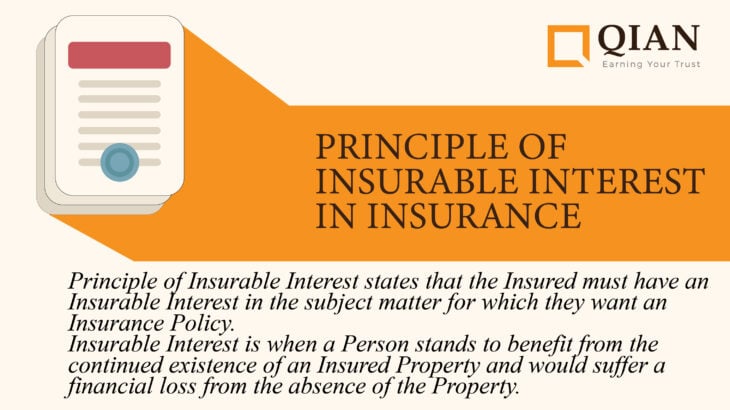What is Insurable Interest in Insurance?
Insurable Interest in Insurance is when a Person stands to gain or benefit from the continued existence or well-being of a Person or an Insured Property and the Person would suffer a financial loss from the absence of the Person or the Property.
Insurable Interest is the legal right of the person to insure the subject-matter with which they have a legal relationship recognized by law.
Principle of Insurable Interest
Principle of Insurable Interest is one of the fundamental principles of Insurance. It forms the legal basis on whether Insurance can be taken or not. The Insured must have an Insurable Interest in the subject matter for which they want an Insurance Policy.
Example of Insurable Interest
Consider an example of Mr ABC who owns a house. In case of fire accident, Mr ABC will suffer financial loss because of damage to the house. Thus, Mr ABC is said to have a insurable interest in the house and can protect himself by purchasing a Fire Insurance Policy for his house.
Another example is that of Mr XYZ. If Mr XYZ falls sick, he is likely to incur costs for his treatment. Thus Mr XYZ is said to have an Insurable Interest in Mr XYZ’s health and can secure themselves with a Health Insurance Policy.
What are the types of Insurable Interest?
There are 3 types of Insurable Interest in Insurance:
1. Common Law: Insurable Interest as per Common Law relates to Self, Spouse, Children, Parents and Assets.
- Self: An individual is said to have unlimited Insurable Interest in his own life and can purchase a Life Insurance Policy based on his/her earning capacity to secure himself.
- Spouse: A husband or a wife have an Insurable Interest in the life of the spouse and each one benefits from the well-being of the other. So, a husband can take a Life and a Health Insurance Policy for his wife and vice versa.
Similarly, even parents can take insurance for their children and children can take insurance for their parents if they are dependent on them.
- Assets: A Person has an Insurable Interest in the asset he owns as he benefits from the use of the Asset and is affected by its absence. The Person can take various policy depending on the type of Assets. For example: A Fire Insurance Policy for Factory or a Motor Insurance Policy for Vehicles.
2. Contractual Interest: Insurable Interest as per Contractual Interest relates to Employer-Employee relationship, Bank-Mortgage Relationship, Company-Keyman Relationship etc.
- Employer-Employee: Employers have an insurable interest in the lives of their employees to the extent of the value of the employee’s services and employees have an Insurable Interest in the employers to the extent of remuneration/salary. Employers usually purchase a Group Health Insurance Policy and Group Term Life Insurance Policy for their employees.
- Bank-Mortgage: Banks have an Insurable Interest in the property mortgaged against the loan. For Example: If Mr XYZ has financed his home with a home loan of Rs10 lakhs, the bank has an Insurable Interest in the home to the extent of Rs10 Lakhs. So, banks can take a Fire Insurance Policy against Mr XYZ’s home.
- Company-Keyman: Companies have an Insurable Interest in the life of certain keyman which they can secure with the help of a Keyman Insurance Policy.
3. Statutory Interest: Insurable Interest as per Statutory Interest relates to Executor-Trustee relationship and Bailee Relationship.
- Executor-Trustees have an Insurable Interest in properties under their charge
- Bailees which include Garage Owners, Warehouse Owners have an Insurable Interest in the goods held by them on behalf of Others, for payment or not.
When should an Insurable Interest exist?
- Life Insurance: In life Insurance, Insurable Interest should exist at the time of buying the policy. It is not necessary to prove insurable interest at the time of making an Insurance Claim.
- Fire Insurance: A Fire Insurance Policy requires that an Insurable Interest exist at the time of purchasing the Insurance Policy as well as at the time of making a Claim.
- Marine Insurance: A Marine Insurance Policy requires an Insurable Interest to exist only at the making a Claim. It does not an Insurable Interest to exist at the time of purchasing the Policy.
The Bottomline
The Principle of Insurable Interest is a fundamental principle of Insurance which serves to eliminate Moral Hazard whereby the Insured is not tempted to commit fraud in order to profit out of his Insurance Policy.
Qian helps businesses get the best insurance coverages and compare insurance quotes amongst various insurance companies. If you have any questions regarding Insurance, you can reach out to us at insurance@qian.co.in or call us on 022-22044989.
We would be glad to assist you!

